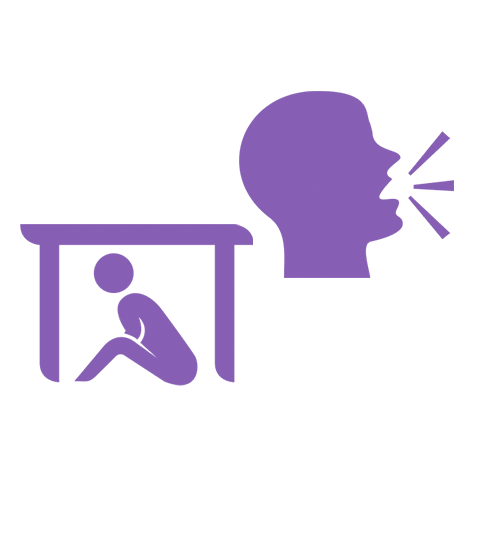Mix and match professional development /training workshop topics
All the training I deliver is personalised to you, aiming to help you and your colleagues support the Autistic people in your context better in terms of the problems they face, local service provision, and your remit. Below is a rough guide to the kinds of topics I am often asked to present on.
What is Autism? This topic can be delivered to professionals, Autistic young people, adults and families.
What is Autism, and what does it mean to be Autistic? What do Neurodiversity and Neuro-divergent mean?
Meltdowns and Shutdowns. This topic can be delivered to Professionals, Autistic kids, adults and parents.
What is the difference between a meltdown and a tantrum? What does it feel like? How can you help to support a person experiencing one. What things can be done to reduce the frequency, length and likelihood of meltdowns and shutdowns.
Tips for Doctors and other Health care professionals.
Autistic people may find lots of things about visiting a. healthcare professional difficult. This talk outlines common issues and simple strategies that can help.
Tips for social workers
Social workers provide a vital role in both adult and children’s services. This topic covers ways of working that recognise the needs and strengths of Autistic people and how to put in place care plans that meet people’s needs and are cost effective.
Understanding how autistic people may think. This can be delivered to professionals or Non Autistic young people/adults.
Some of the ways Autistic people often think may seem very different to Non Autistic people’s thought processes, but you can learn to understand and appreciate the differences.
Puberty. This topic can be delivered to professionals, parents and young people.
How might an Autistic person of any gender experience puberty and how can you best support them?
Periods. This Topic can be delivered to professionals or Autistic people.
What difficulties might Autistic people experience when starting and managing periods? What can help make periods more bearable? This talk can also be delivered to young people.
Play and Break times.
Unstructured time can be really hard for Autistic people, and cost more energy then academic learning time, This topic focuses on practical tools and tips to help unstructured time be beneficial for everyone.
Job Interviews. This topic can be delivered to professionals or Autistic people.
Autistic people often struggle with job interviews, but it is possible to learn skills which will help.
Preparing for post 16. This topic can be delivered to professionals, parents and young people.
What options are available for Autistic young people leaving school or college?
Transitions
Transitions happen all day, everyday, between tasks, between rooms, between focus as well as big transitions like primary to secondary school. This topic looks at what can be difficult abut Transitions for Autistic people and what can help.
Diagnosis, now what? This topic can be delivered to professionals, parents, carers, Autistic young people, siblings and Autistic adults.
When you or someone you support has just received a Autism diagnosis it can feel overwhelming.
Sound Sandwiches
a workshop offering the opportunity to work with a Autistic adult without the focus being on Autism making layers of sounds with microphones and guitar pedals.
Mandatory Autism training
Under the Autism Act 2009 Local Authorities have to provide their front line staff with Autism training.
Emotions. This topic can be delivered to professionals or Autistic kids and adults, siblings and parents.
How to help Autistic people recognise emotions and manage them.
Tips for TA’s, LSA’s and other school staff
How you can best support young people with their academic studies and overall wellbeing in school.
Current thinking about Autism. This topic can be delivered to professionals or autistic/non autistic young people.
New research into Autism is happening all the time. With a growing amount of research being Autistic-led and focusing on to Autistic people’s experiences and priorities. This topics may be of particular interest to students studying psychology, social work, and health care related topics.
Flexibility
Many Autistic people find it hard to be flexible. There are ways of supporting this, so they can make more choices and try new things.
Friendship. This topic can be delivered to professionals Autistic-and non autistic young people, adults and parents.
How to help Autistic people understand and manage friendships.
Online and Technology Safety. This Topic can be delivered to professionals or Autistic people.
How to help Autistic people stay safe while using technology.
Managing time. This topic can be delivered to professionals or Autistic people.
Many Autistic people find managing time very difficult. However, there are lots of strategies that can help.
Getting into work. This topic can be delivered to professionals or Autistic people and their families.
What kind of careers can be good for Autistic people? How do you go about navigating getting and keeping a job?
Leaving home. This Topic can be delivered to professionals or Autistic people.
What might the difficulties be? How can you prepare, and what support might you need?
Independent travel. This Topic can be delivered to professionals or Autistic people.
How to support Autistic people to travel independently and safely.
Robyn’s Research. This topics can be delivered to professionals, families and young people
What did she find out and learn? How can this benefit the wider Autism community?
Reach your dreams
A talk for young people to inspire them to reach their goals in life and believe in themselves.
Sensory
What are the ways Autistic people experience the sensory world? How can you help support them to manage their sensory experience.
Strength based approach to supporting Autistic people. This can be delivered to Autistic people or professionals
The Care Act 2014 talks about strength based approaches to supporting people. This topic explores how you can Identify the strengths of a person and using those strengths to support them.
Tips for Supporting Adults.
Practical strategies for support workers working with adults, to help them get the most out of life.
Communication
What are the common difficulties faced by Autistic people around social communication? This session focuses on what strategies and adaptations can be put in place to help everyone understand each other.
Understanding Behaviour
Understanding behaviour and its causes. Introducing tools like ABC charts and Kari Dunn’s 5 point scale.
Women and Girls. This topic can be delivered to professionals, young people and parents.
What may help recognise Autistic people who may otherwise struggle to get a diagnosis, and looks at some behavioural trends like masking and camouflaging that are often association with Autistic women and girls but potentially could be present in any gender.
Bullying. This topic can be delivered to professionals or Autistic people.
How to give Autistic people the skills to avoid bullying and get help.
Change and Uncertainty. This topic can be delivered for professionals or Autistic people.
How to help Autistic people manage change.
Self employment. This talk can be delivered to professionals or Autistic people and their families.
How can Autistic people access self employment?
Supporting Adults. This topic can be delivered to professionals and parents or carers.
What you can do to support adults on the Autism spectrum.
Using interests. This topic can be delivered to professionals or Autistic people.
How to use Autistic people’s passions to support them, and broaden the opportunities available to them.
Meet an Autistic Adult. For Autistic and Non Autistic kids and adults.
A chance to meet an Autistic adult can be a really positive experience for young people.
School assemblies and class workshops
Robyn will teach you about Autism.
Creating/adapting Autism friendly environments
How do you do it? A hands on approach with no expensive equipment required.
Anxiety. This topic can be delivered to professionals or Autistic people
Helping Autistic people recognise Anxiety and understand how to control it.
Tips for teaching Autistic students
Practical strategies for supporting Autistic students in school, further and Higher education.
Making the most of direct payments/personal budgets
The transforming care and personalisation agendas in adult social care have resulted in a shift away from day services and residential settings to community based self directed support. This topic explores how this new found freedom can be best used to give people quality lives.
Navigating romantic relationships and sex.
How can you support Autistic people through romantic relationships and to make positive safe choices.
Safety. This topic can be delivered to professionals and young people.
How can Autistic people gain independence and stay safe?
Screen time is not just a reward.
How can you support Autistic people to use technology to help leaning and independence?
Understanding other people
It can be hard for Autistic people to understand non Autistic people and vice versa but there are tools and tips that can help.
Abstract thought. This topic can be delivered to professionals and parents.
Often Autistic people struggle with abstract concepts like. money-and time but there are lots of ways-of supporting them with this.
Q&A
A opportunity to ask your questions. popular with all audiences.
Robyn’s Experience. This topic can be delivered to professionals or Autistic people.
Robyn talks about her experience and what has helped her to become successful.
Relaxed Musical performance
Funky Trumpet.
5 Things about Autism
A talk for kids to help them learn about Autism.




















































